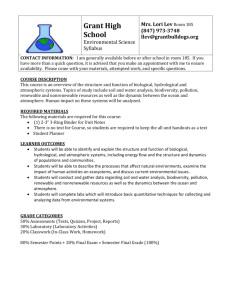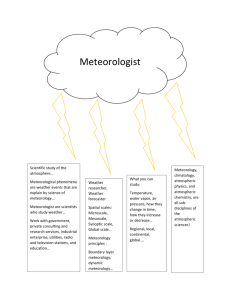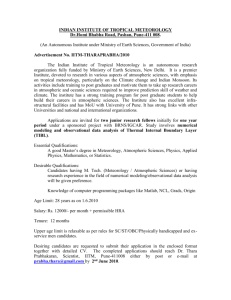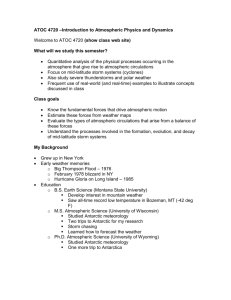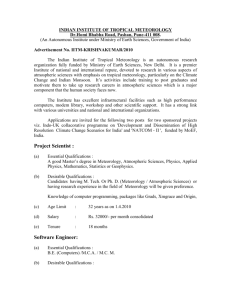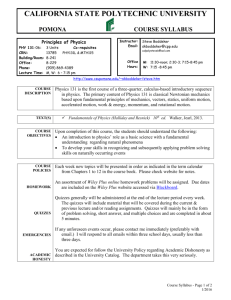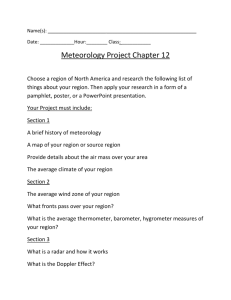Syllabus - Dr. Robert MacKay
advertisement
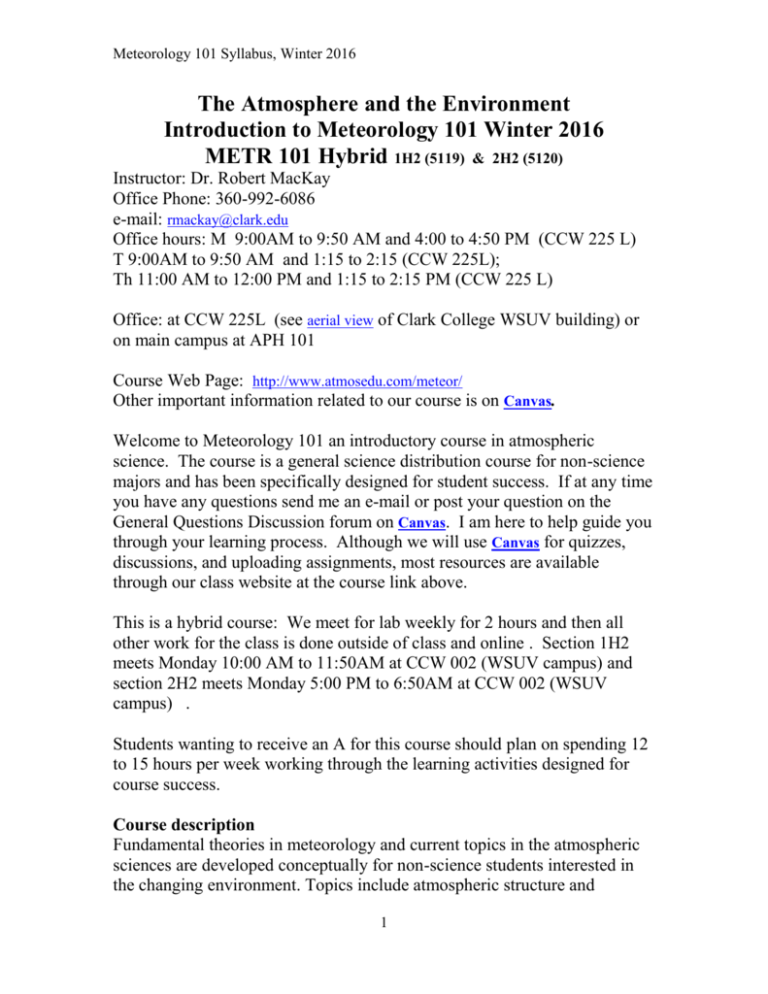
Meteorology 101 Syllabus, Winter 2016 The Atmosphere and the Environment Introduction to Meteorology 101 Winter 2016 METR 101 Hybrid 1H2 (5119) & 2H2 (5120) Instructor: Dr. Robert MacKay Office Phone: 360-992-6086 e-mail: rmackay@clark.edu Office hours: M 9:00AM to 9:50 AM and 4:00 to 4:50 PM (CCW 225 L) T 9:00AM to 9:50 AM and 1:15 to 2:15 (CCW 225L); Th 11:00 AM to 12:00 PM and 1:15 to 2:15 PM (CCW 225 L) Office: at CCW 225L (see aerial view of Clark College WSUV building) or on main campus at APH 101 Course Web Page: http://www.atmosedu.com/meteor/ Other important information related to our course is on Canvas. Welcome to Meteorology 101 an introductory course in atmospheric science. The course is a general science distribution course for non-science majors and has been specifically designed for student success. If at any time you have any questions send me an e-mail or post your question on the General Questions Discussion forum onCanvas. I am here to help guide you through your learning process. Although we will use Canvas for quizzes, discussions, and uploading assignments, most resources are available through our class website at the course link above. This is a hybrid course: We meet for lab weekly for 2 hours and then all other work for the class is done outside of class and online . Section 1H2 meets Monday 10:00 AM to 11:50AM at CCW 002 (WSUV campus) and section 2H2 meets Monday 5:00 PM to 6:50AM at CCW 002 (WSUV campus) . Students wanting to receive an A for this course should plan on spending 12 to 15 hours per week working through the learning activities designed for course success. Course description Fundamental theories in meteorology and current topics in the atmospheric sciences are developed conceptually for non-science students interested in the changing environment. Topics include atmospheric structure and 1 Meteorology 101 Syllabus, Winter 2016 composition, global circulation and atmospheric motions, clouds and precipitation, weather patterns and weather prediction, tornadoes, hurricanes, the greenhouse effect, atmospheric ozone, air pollution, and El Nino. Questions about our local weather forecasts? http://www.wrh.noaa.gov/pqr/ (see video on how to get your 5 day forecast) Required Materials. Text Book: Meteorology Today 9th or 10th Edition, by C. Donald Ahrens (see ebook purchase option) There are 5 copies on reserve at the main campus library for student use. You may check these out from the desk for up to 3 hrs each time. A calculator that adds, multiplies, and divides Access to MS Word , Excel, and PowerPoint or open office suite (free) [http://download.openoffice.org/] When submitting written work save your files in MS Word .doc format (or docx) or .pdf format. If you use OpenOffice Writer you can save in either .doc or .pdf format. Also try to name your files without any spaces. Example ThisFile.doc as opposed to This file.doc. Mathematics Requirements: Students should be able to add, multiply, and divide. During the first two weeks we will be reviewing graphs and learning how to use Excel for scientific purposes. Some of the material seems kind of Mathy but please do not let it frighten you. I do understand that many in our class have Math anxiety so I have gauged activities accordingly. Please ask questions when you feel stumped. Posting questions on the discussion board is a great way to go as some of your fellow classmates may have some good ideas. Sending me an e-mail directly is also a good way to get questions answered in a timely manner. Assessment: 3- Exams (21%) + Final (14%): 35% for all exams Case Study Presentation 5 % (see CaseStudy for specifics) Weather Story 5 % (see WeatherStory for specifics, Due Feb 15) Discussion board postings; see below (5%) Online reading quizzes 10 % Labs 15% All other Homework (25%) 2 Meteorology 101 Syllabus, Winter 2016 Total grade scale A (100-93%) A- 93-90% D+ 70-67% D 67-63% D- 63-60% B+ 90-87% B 87-83% B- 83-80 % C+ 80-77% C 77-70% F less than 60% Below is more information related to each activity with links to even more detail where appropriate. Exams: The readings, homework, and online quizzes are meant to prepare you for exams. The idea is to go back over these things to solidify your knowledge and understanding. Exam study guides include sample exam questions and should be studied. Each student will take a unique online exam taken randomly from a pool related to online quizzes and sample study questions. Exams are available from Friday 1AM through Wednesday 11PM; at the end of the 3rd , 6th , and 8th weeks (there are three mid-term exams). The final exam is available from Friday of the last full week of class through the Wednesday of finals week. See tentative schedule below. Discussion Board Postings : There will be five discussion forums throughout the term based on a specific question or topic. Each of these will be available for a two week period (weeks 1&2, Weeks 3&4, Weeks 5&6, Weeks 7 &8, and week 9&10) . During the first week for a discussion (week 1, 3, 5, 7, and 9), post your original ideas on the discussion topic. Original posts posted later than the first week of the discussion will be considered late, and will reduce your overall discussion score. During the second week reply to at least 2 posts that interest you or inspire a comment from you. For full credit on the discussion portion of our course you must post five meaningful original posts over the course of the term ( 1 for each bi-weekly topic) and reply to at least two other posts each biweekly interval (minimum total of 10 replies over the term). Quality discussion postings should have reference to data or diagrams whenever possible and cite references for any factual information. Your original post does not have to be long but it should contain solid information that contributes to the discussion topic and at least one reference/URL. Your opinions are valued but also try to include factual information whenever possible. Discussion posts will not be allowed after the discussion due date. Online Reading quizzes: Online reading quizzes will be included within each unit of Canvas. Although the quizzes are only 10 % of your overall grade they will help you with all other aspects of the course including exams. Some exam questions will be directly from the reading quiz questions. Please feel free to work with others in the class on these online quizzes. The purpose of these is to highlight some of the key ideas, 3 Meteorology 101 Syllabus, Winter 2016 concepts, and interesting facts presented in the assigned reading. The quizzes are accessed through Canvas within each unit and are due by the Monday after the week corresponding to the unit. Late quiz submission are accepted with penalty but all Quizzes related to a particular exam will become unavailable at the same time the exam becomes unavailable. Lab This is a hybrid course meeting for lab each week. All other course material will be completed online. Lab attendance is essential for success in this course. Tentative Schedule Wk # Chapter Topic Lab 1 Ch1: Earth System and Intro Water Bucket 2 Ch2: Energy transfer / Greenhouse Effect 3 Ch3: Seasons /Temperature control Temperature and Heat Solar Zenith Exam #1 available Fri Jan 22 – Wed Jan 27. 4 Ch4 Humidity 5 Ch 5 fog and clouds Ch 7 Precipitation 6 Ch8 Air motions 7 Exam #2 Available Fr Feb 12 -Wed Feb 17 Ch 10: Global Wind System and Oceans Ch 11: Air masses, Fronts (tiny bit of ch 11) 8 Ch 14: T-storms and tornadoes 9 Exam #3 Available Fri Feb 26-Wed Mar 2 Ch 13: weather forecasting Ch 15: Hurricanes 10 Final Humidity Cloud Physics Air Pressure Lab Weather Maps Severe Storm Lab Ch 16: Climate Change Final Exam Available Wednesday Mar 9 through Wednesday Mar 16 CO2 Lab Case Study Presentations Mar 7 Other homework will often be presented to you as an MS word document that you can edit by adding your answers and then submitting (upload) via Canvas. Occasionally you will be asked to draw your own figure. It is okay to draw a nice figure by hand and then either scan it or take a digital photo to electronically insert into and MS Word Document or other presentation document. I like to use a paint program to process the image a little before pasting it into a document, as this can make the total document size much more manageable. When submitting written work save your files in MS Word .doc format (or docx) or .pdf format; other formats will not be 4 Meteorology 101 Syllabus, Winter 2016 accepted. Also try to name your files without any spaces, extra dots, or special characters. Example ThisFile.doc as opposed to This file.doc. Homework is typically due by Monday evening at 11:55 PM the week following the assignment. Overall course learning objectives: o Students will recall, recognize, select and apply physical laws, facts, and concepts related to the atmospheric sciences and the Earth system, and provide examples of how these relate to our everyday experiences. o Students will be introduced to methods of the atmospheric sciences: Students will use data acquisition and observations, data visualization (graphs, charts, and maps), pattern recognition, analysis and modeling to interpret and explain facts, concepts, hypotheses, and theories related to atmospheric science – the effective application of scientific methodology. Students will use the methods of atmospheric sciences in assignments and classroom and laboratory activities. o Students will make computations related to the atmospheric sciences using relevant information, physical relationships and appropriate units. o Students apply concepts learned in class to analyze and explain everyday atmospheric phenomena and historic weather events. Class Policies Each student is expected to be courteous to others and observe the rules and regulations of the college at all times. Attendance Attendance and punctuality are essential for success in this class as well as being a lifelong learning skill. Each student is expected to attend lab sessions on a regular basis. If you do miss our weekly lab session it is your responsibility to obtain all assignments and/or handouts. In addition, it is your responsibility to make sure that you learn the material covered in class. No makeup points will be given for these assignments so attendance is important. Students showing up late to lab will lose 1 pt from their lab score for each four minutes late. For example, if a student is 16 minutes late to lab then their lab score will be reduced by 4 points. If 5 Meteorology 101 Syllabus, Winter 2016 circumstances prohibit a student from arriving on time the student should plan on doing a make-up extra credit assignment. Class Participation Each student is expected do all class activities. The course is designed to provide scaffolding early in the quarter to build skills and knowledge needed later in the quarter. The exams will typically be based on topics that are included in readings, online videos, Power-point summaries, online quizzes, and labs. The Clark College faculty and administration agree that for every one hour in class students should be spending 2 to 3 hours outside of class working on learning activities (reading, writing, homework). With this in mind, expect to spend approximately 12 to 15 hours a week on the course (120 to 150 hours for 10 week course) if you are aiming for an A grade. Don’t fall behind, as it is very difficult to catch up. It is important to maintain a safe learning environment by showing unconditional respect for others. One must be particularly careful when communicating electronically as often the written word can be perceived differently than intended. This is demonstrated by being respectful of others and their opinions, taking one another seriously, and allowing humor to be a part of the class. Entering into class discussions and asking questions is important but try to be extra courteous to others and their opinions. Make-up Policy To assess student understanding of reading, ideas presented in class, and laboratory activities periodic quizzes and exams will be given. If a student does miss one exam they will be given a grade based on 80 % of the average of the other exam scores (including the final) for the missed exam. If a student misses the final but has completed all 3 exams then they will be given a grade based on 80 % of their average exam scores. Exams are available for six days so all students will have plenty of time to study for and complete each exam. Late home work will be accepted with a 10 % penalty for up to 24 hours late, 20% penalty for 24 to 48 hours late, and 50% penalty for more than 48 hours late. Homework received after it has been graded for the class will not be accepted. The extra credit option discussed below allows you to "make-up" missed assignment points. Withdrawals The withdrawal policy is published in the Clark College schedule of day & evening classes Change of registration and withdrawals. Please 6 Meteorology 101 Syllabus, Winter 2016 communicate with the instructor before withdrawing from the course as this action may not be necessary. A class officially dropped before the tenth day of instruction will not be entered on your transcript. After the tenth day and through the seventh week of the quarter, classes formally dropped will be posted to your transcript with a withdrawal grade of "W". No withdrawals will be accepted after Friday of the seventh week of the quarter. Withdrawal Appeals Students unable to withdraw by the end of the eighth week of the quarter due to extenuating circumstances should contact the Dean's Office by the end of the last scheduled class day. Lab attendance Any student missing more than 2 labs will receive an incomplete for the course (provided a C or better has been earned for all work in the course). Laboratory exercises are assigned weekly. Each lab activity missed by the student may reduce their overall course grade by up to 2 %. Safety is of utmost importance at all times. Since the laboratory environment can present unusual safety hazards the Science division has placed special emphasis on laboratory safety. Please be extra careful while in the laboratory and help maintain safety campus wide by reporting any potentially hazardous situations immediately to the instructor. Academic Honesty is required at all times. Copyright laws, plagiarism rules shall be observed at all times. Plagiarism is representing another's work as your own, or recycling your work and representing earlier work as new work. Plagiarism will not be tolerated in this course and is grounds for failing the course. Copying text directly from online resources and pasting into your own documents is a form of plagiarism. It is best to restate ideas in your own words to summarize important findings. Citizenship One of the Clark College campus abilities is Effective Citizenship. Always be courteous to yourself, other students, and the instructor. Respect the rights of others to have feelings and opinions that may be different than your own. All students are expect to follow the Clark College Code of Student conduct. Extra Credit Students will be given some opportunity for extra credit which can increase their overall grade by up to 5 percentage points. If a student is interested in developing their own extra credit activity/research project related to an aspect of atmospheric science that is of interest to you 7 Meteorology 101 Syllabus, Winter 2016 please talk with your instructor. Writing summaries of papers, essays or books related to atmospheric or environmental science issues of particular interest to you are worth up to 1 % of your overall grade each (10 pts). See Paper Summary for guidelines and articles for some possible ideas. Students may also submit one YouTube video summary related to a class topic of their choice for up to 0.6 % extra credit (~ 6 pts). See YouTubeVideo Summary for more details. All extra credit and any other late assignments must be turned in by Monday Mar 14. ADA Accommodations: If you have emergency medical information which should be shared; or if you require assistance in case the building should be evacuated; please make an appointment to see me as soon as possible during the office hours indicated in this syllabus. Any student with a disability who may require accommodation in order to fully participate in this class should contact the Disability Support Services Office at (360) 992-2314 or (360) 991-0901 (VP) or stop by PUB 013. For further information see: (http://www.clark.edu/dss) Office hours -Monday through Thursday: 7:30am - 5:00pm; Friday: 7:30am - 2:00pm. Non-discrimination Policy: Clark College affirms a commitment to freedom from discrimination for all members of the college community. The college expressly prohibits discrimination against any person on the basis of: Race, color, national origin, disabled veteran status, sex, sexual orientation, age, gender identity, creed, gender expression, Vietnam-era veteran status, religion, marital status, and presence of physical, sensory or mental disability. The responsibility for, and the protection of, this commitment extends to students, faculty, administration, staff, contractors, and those who develop or participate in college programs. It encompasses every aspect of employment and every student and community activity. Important College-Wide Student Information: Visit www.clark.edu/cc/syllabi for important college-wide student information. 8
